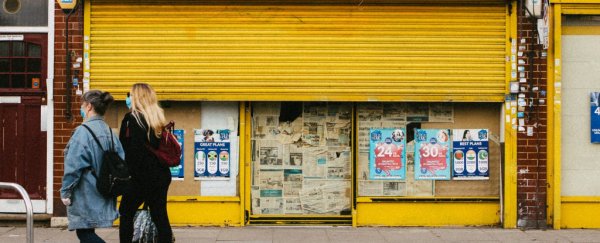Businesses from Milan in Italy to Roswell in Georgia have begun opening up after weeks and months of coronavirus-induced shutterings.
Italians last weekend headed outside to enjoy their first weekend outdoors since early March, when that country's COVID-19 lockdown began. Most, but not all, were wearing their requisite masks.
In the US, experts warned last week that no state is ready to reopen, and Anthony Fauci, the nation's leading disease expert, is expected to tell the Senate on Tuesday that "needless suffering and death" is on the horizon if the US opens up too quickly.
With so many countries and states weighing when, exactly, the time might be right to relax their lockdown measures, then World Health Organisation detailed on Monday three basic questions that "can help determine whether a lockdown can be released slowly or not."
"First, is the epidemic under control?" WHO Director General Tedros Adhanom Ghebreyesus said.
"Second, is the healthcare system able to cope with the resurgence of cases that may arise after relaxing certain measures?" and, "third, is the public health surveillance system able to detect and manage the cases and their contacts and identify a resurgence of cases?"
Unfortunately, the US does not tick any of those boxes yet.
The epidemic is still spreading widely across many states in the heartland, from Tennessee, to Kentucky, Wisconsin, Nebraska, and Georgia, according to leaked data from the White House obtained by NBC News.
There are serious disparities in the US healthcare system which need to be addressed if everyone is to have proper access to coronavirus testing and care in the coming weeks and months, and the public health surveillance system is in need of a major digital upgrade to properly identify outbreak resurgences, and test and trace every new case.
The WHO stressed that as lockdowns are lifted, and people mix and mingle more, there will, inevitably, be some new infections. That's why countries and cities should proceed cautiously and clearly when reopening, making sure they're ready to deal with any eventual surge.
"As restrictions are lifted, people will mix more, that is undoubted," the WHO's Executive Director of Health Emergencies, Mike Ryan, said.
"The risk of transmission will potentially go up. The question is, can we reach a point where we have strong public health measures in place where we can investigate clusters of cases and suppress those clusters without going back to the intense transmission patterns of before?"
He pointed out that crowds of people gathering to party (as some college students did in Colorado last week) are probably some of the "riskiest" situations possible.
In the UK, confusion about reopening that country safely has reigned in recent days, as people weigh the new 50-page coronavirus reopening guidelines Prime Minister Boris Johnson released on Monday, which go against earlier guidance, by telling people to wear face masks when out in public.
The reopening plans also left many businesses confused about when, and how, to properly reopen their offices.
Ryan stressed that's it's important, as all countries begin to reopen, that they create new ways to reduce transmission when people must be together, avoid big crowds and gatherings, and identify when new clusters of coronavirus cases emerge.
He mentioned Germany and South Korea as places that are doing this kind of careful reopening right.
"It's really important that we hold up examples of countries who are willing to open their eyes and willing to keep their eyes open," Ryan said, alluding to the idea that more lockdowns might be necessary if and where cases spike.
"Shutting your eyes and trying to drive through this blind is about as silly an equation as I've seen," Ryan added.
"I'm really concerned that certain countries are setting themselves up for some seriously blind driving over the next few months."
This article was originally published by Business Insider.
More from Business Insider:
